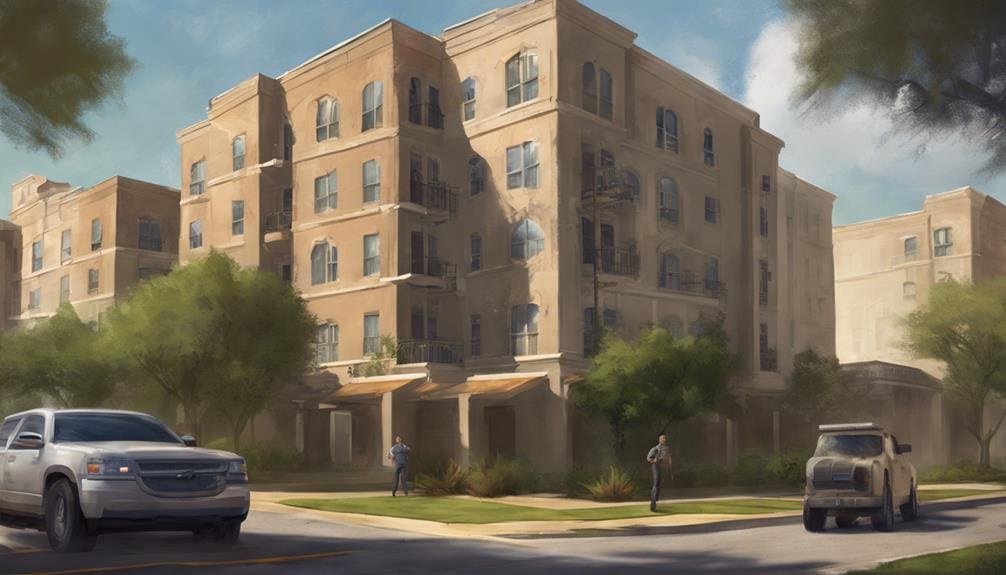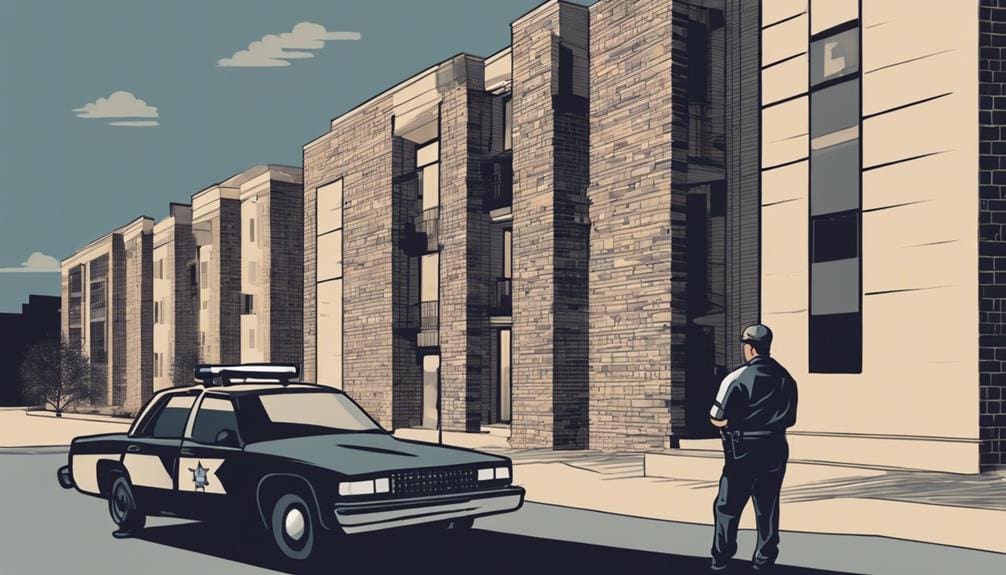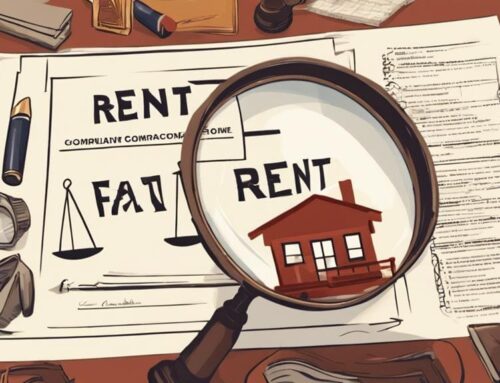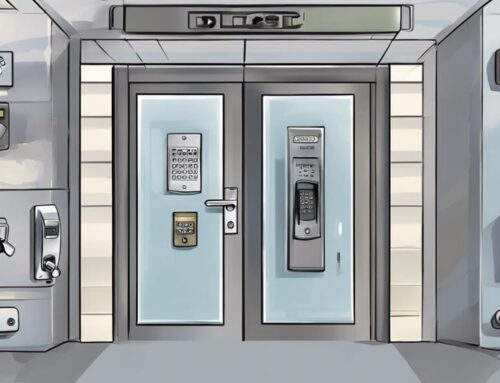As a Texas landlord, you must follow residential crime laws to guarantee tenant safety and decrease liability risks. By adhering to these laws, you protect tenants from criminal activities and comply with building codes and local regulations. Implementing effective security measures and maintaining them regularly can decrease your legal risks and demonstrate a commitment to providing a secure living environment. Guaranteeing that security devices meet legal requirements and promptly addressing any safety concerns also help foster trust and transparency with tenants. Curious about specific steps to guarantee compliance and maintain a secure property?
Key Takeaways
- Ensuring tenant safety and security is a legal obligation for Texas landlords.
- Compliance with crime laws prevents significant liability and legal consequences.
- Adhering to laws maintains a responsible and trustworthy landlord status.
- Following crime laws helps reduce the risk of criminal activities on the property.
- Proper security measures protect tenants and uphold building code standards.
Legal Responsibilities

Texas landlords must ensure tenant safety by adhering to specific legal responsibilities aimed at mitigating residential crime. As a landlord in Texas, you’re legally obligated to protect your tenants from criminal activities on your property. This isn’t just about maintaining good relationships—it’s about complying with building codes, ordinances, statutes, and court decisions that define your obligations.
Your legal duties include taking reasonable precautions and warning tenants of known risks. If you fail to deliver on promised security features, you could be held liable. For instance, if you advertise a property as having secure locks or surveillance systems, you must guarantee these features are functional and well-maintained. Ignoring these responsibilities can lead to significant legal consequences.
Moreover, promptly addressing tenant safety concerns is vital. Regular inspections and timely repairs not only enhance property security but also demonstrate your commitment to tenant welfare. Texas law is clear: negligence in these areas can result in liability for any criminal acts that occur on your property.
Preventing Liability

By taking proactive steps to prevent liability, landlords can safeguard their properties and guarantee tenant safety. Adhering to safety laws and security requirements is essential to mitigate liability risks stemming from criminal acts. Evaluating and updating your security systems based on local crime statistics can considerably reduce these risks.
It’s not just about installing locks and cameras; it’s about understanding the specific threats your property might face. Education is another critical component. Informing your tenants about prevalent crime problems and the security measures in place empowers them to act responsibly and stay vigilant. This shared sense of responsibility fosters a community-oriented approach to safety.
Regular maintenance and timely repairs are non-negotiable. A well-maintained property is less likely to attract criminal activity, thereby decreasing your liability risks. Neglecting these tasks can lead to vulnerabilities that criminals might exploit.
Tenant Safety

Maintaining tenant safety necessitates landlords to implement and maintain robust security measures throughout their properties. As a Texas landlord, you have a legal obligation to provide secure residential properties by installing and maintaining adequate security features. This includes essential security measures such as window latches and deadbolts, which are vital for tenant protection.
To meet your legal obligation and foster a sense of safety among your tenants, consider the following:
- Install and maintain security devices like window latches and deadbolts to prevent unauthorized entry.
- Respond promptly to tenant requests for additional security features, even if they agree to cover the costs.
- Regularly inspect and upgrade security systems to ensure they remain effective and up to code.
Failing to provide adequate security could result in liability for criminal acts occurring on your property. Hence, it’s important to stay proactive in maintaining and upgrading your property’s security measures.
Property Maintenance

To guarantee tenant safety, you must conduct regular safety inspections and address repair requests promptly.
Upgrading security features not only complies with Texas law but also reduces potential legal liabilities.
Consistent property maintenance demonstrates your commitment to providing a secure living environment.
Regular Safety Inspections
Regular safety inspections play an essential role in maintaining property security and guaranteeing tenant safety. By routinely checking and servicing security devices, you can identify and address potential risks before they escalate. This proactive approach not only enhances property maintenance but also deters criminal activities, providing a safer environment for your tenants.
- Security Devices: Confirm locks, alarms, and lighting systems are functional.
- Inspections: Conduct regular checks to spot and fix issues early.
- Liability Risks: Decrease the chances of being held accountable for crimes on your property.
By performing regular inspections, you can stay compliant with Texas laws that mandate the upkeep of security features in rental properties. These laws are in place to protect tenants and, by extension, shield you from legal repercussions. When security devices are well-maintained, tenants feel more secure, fostering a sense of community and belonging.
Moreover, thorough property maintenance through regular safety inspections minimizes liability risks. If a criminal incident occurs and it’s evident you’ve neglected necessary maintenance, you could face legal consequences. Regular inspections demonstrate a commitment to tenant safety, reducing your exposure to such risks and reinforcing your role as a responsible landlord.
Prompt Repair Response
Addressing repair requests promptly is vital for maintaining the functionality of security devices and guaranteeing tenant safety in Texas rental properties. As a landlord, you’re legally obligated to install and maintain security devices like window latches and deadbolts. Ignoring repair requests can lead to severe legal liabilities under Texas property codes, putting both your tenants and your investment at risk.
By swiftly attending to repair requests, you not only comply with the law but also foster a sense of security and trust among your tenants. Ensuring that all security devices are in working order is essential for tenant safety, reducing the likelihood of break-ins and other security breaches.
Remember, tenants have the legal right to request the installation or repair of security devices at your expense. Failure to act on these requests can result in penalties and potentially costly legal battles. Texas property codes have specific exceptions, but generally, they require landlords to respond promptly to guarantee all security measures are effective.
Security Feature Upgrades
How can Texas landlords stay compliant with residential crime laws while guaranteeing their properties are secure and well-maintained? By focusing on security feature upgrades, you can meet the stringent requirements of the Texas Property Code and prioritize tenant safety. Here’s how you can achieve this:
- Install and maintain security devices: Make sure window latches, deadbolts, and other security features aren’t only installed but also regularly checked for functionality.
- Respond to tenant requests: Tenants have the right to request the installation or repair of security devices. Act promptly to address these requests to avoid legal consequences.
- Regular property inspections: Conduct routine inspections to guarantee all security devices meet the standards set by residential crime laws.
Being proactive in security feature upgrades isn’t just about compliance; it’s about fostering a safe and welcoming environment for your tenants. Neglecting these responsibilities can lead to severe legal consequences, including liability for any harm that comes to tenants due to inadequate security measures.
Addressing Crime Issues

To address crime issues, you must prioritize tenant safety measures, ensuring compliance with legal requirements such as installing and maintaining security devices.
Effective communication and transparency with tenants about these measures are essential to fostering trust and ensuring their protection.
Ignoring these responsibilities can lead to legal liabilities and jeopardize your standing as a responsible landlord.
Tenant Safety Measures
Landlords in Texas must proactively put in place safety measures like installing locks, improving lighting, and setting up surveillance systems to mitigate crime risks for their tenants. Addressing tenant safety concerns through these security measures is vital for preventing crime issues and guaranteeing a secure living environment.
By taking these steps, you’re not just reducing criminal risks but also fostering a community where tenants feel safe and valued.
Here are three effective security measures you should consider:
- Enhanced Lighting: Well-lit areas can deter potential criminals, making your property less appealing for illicit activities.
- Surveillance Systems: Installing cameras in strategic locations can significantly decrease criminal risks and provide valuable evidence if a crime occurs.
- High-Quality Locks: Upgrading to advanced locking mechanisms can prevent unauthorized access and enhance overall tenant security.
Implementing safety measures involves regular maintenance and repairs to make sure that all security devices function correctly.
Educate your tenants about potential crime problems and the measures you’ve put in place, empowering them to stay vigilant.
Legal Compliance Requirements
Ensuring tenant safety isn’t just about implementing security measures but also involves strict adherence to Texas’s residential crime laws. As a landlord or property manager, you’re required to comply with various landlord-tenant laws in Texas that focus on crime prevention. These laws mandate that you address crime issues promptly and effectively, ensuring your property remains a safe living environment.
One key requirement is conducting thorough background checks on potential tenants. Understanding a tenant’s criminal history helps you make informed decisions and mitigate risks. Adhering to these laws also involves maintaining security devices, such as locks and lighting, as stipulated by state and local building codes and ordinances.
Failure to comply with these legal requirements can result in significant liability if preventable criminal acts occur on your property. By addressing crime issues proactively, you not only protect your tenants but also reduce your legal risks and foster a positive landlord-tenant relationship.
Compliance with residential crime laws isn’t just a legal obligation; it’s an essential aspect of responsible property management that benefits both you and your tenants.
Communication and Transparency
Effective communication and transparency about crime issues are essential for fostering trust and ensuring tenant safety in Texas rental properties. As a landlord, you’ve got to be upfront about any crime concerns and the security measures you’ve implemented. This openness helps tenants feel secure and informed, ultimately building a stronger landlord-tenant relationship.
To keep your tenants well-informed and engaged:
- Detail Security Measures: Clearly outline the steps you’ve taken to enhance safety, like installing better locks or security cameras.
- Timely Updates: Regularly inform tenants about any crime-related incidents and the actions you’re taking to address them.
- Open Dialogue: Encourage tenants to report suspicious activities and assure them that their concerns are taken seriously.
Screening Tenants

Why is proper tenant screening so important for selecting reliable and trustworthy residents in Texas rental properties?
Tenant screening is vital because it helps you identify residents who’ll pay rent on time, maintain the property, and adhere to community standards. By evaluating rental history and credit history, you can assess an applicant’s financial responsibility and reliability.
Moreover, the process must be transparent; clearly communicate your screening criteria and any associated application fees to guarantee compliance with Texas state laws and the Fair Housing Act. This transparency fosters trust and minimizes misunderstandings, creating a sense of belonging within your community.
Effective tenant screening also involves background checks and income verification. Make sure you respond to applications within the required 7-day period, even though Texas law doesn’t set a specific timeline. This timely communication shows respect for applicants’ time and reinforces your commitment to fair and efficient processes.
Dealing With Drug Activity

Landlords must proactively address any suspected drug activity on their rental properties to avoid severe legal and financial repercussions. Texas law imposes strict penalties on landlords who allow drug dealing on their premises. Ignoring such activity can lead to:
- Lawsuits: Tenants affected by drug activity can sue for damages.
- Fines: Government agencies can levy substantial fines for non-compliance.
- Property Forfeiture: Authorities may seize properties known for drug dealing.
You’re not only protecting your rental property but also ensuring tenant safety and compliance with Texas law. Failing to act can result in significant legal consequences, ranging from financial penalties to criminal charges.
Regular property inspections and maintaining open communication with your tenants can help identify suspicious activities early. Clear lease agreements with clauses against illegal activities provide a legal basis for eviction if necessary.
Property Manager Oversight

While addressing drug activity is vital, maintaining vigilant oversight of property managers is equally important to safeguard your rental property and maintain legal compliance. Property managers play a pivotal role in the daily operations of your property, and their adherence to legal guidelines and ethical standards is non-negotiable. Rigorous supervision is essential to guarantee that they act in your best interest and uphold the integrity of your property.
To start, thorough background screening of potential property managers is crucial. This step helps in weeding out candidates with a history of misconduct, thereby minimizing risks.
Equally important is addressing tenant complaints about property managers promptly. This proactive approach fosters a positive landlord-tenant relationship while ensuring issues are resolved before escalating into larger problems.
Insurance coverage for any illegal acts committed by property managers is another layer of protection for you. It’s vital to have policies in place that safeguard your interests.
Finally, immediate action upon receiving reports of illegal acts is essential. This not only protects your reputation but also ensures compliance with legal obligations, thereby maintaining the trust and confidence of your tenants.
Supervising property managers diligently ensures your property remains a safe, compliant, and attractive place to live.
Legal Compliance

Securing legal compliance with Texas residential crime laws is crucial for safeguarding your property and protecting tenant rights. As a landlord, adhering to the Texas Property Code Chapter requirements for security devices is non-negotiable. These laws mandate the installation and maintenance of essential security devices like window latches and deadbolts, which are critical for tenant safety.
Consider the following to stay compliant:
- Install Security Devices: Make sure that all mandated security devices are installed correctly and promptly in your rental properties.
- Respond to Tenant Requests: Tenants have the right to ask for the installation or repair of security devices at your expense, and you must address these requests promptly.
- Avoid Legal Liabilities: Non-compliance with residential crime laws can lead to significant legal liabilities, including fines and potential lawsuits.
Ensuring Safety: The Role of Licensed Locksmiths
Adhering to residential crime laws is crucial for Texas landlords, and partnering with a licensed locksmith like Low Rate Locksmith Texas is an excellent way to ensure compliance. As a top-rated locksmith service provider, Low Rate Locksmith Texas understands the state’s stringent locksmith licensing requirements, which mandate extensive background checks and rigorous training for all technicians. This commitment to security and professionalism makes Low Rate Locksmith Texas a trusted choice for landlords looking to enhance the safety of their properties. By following state laws and working with reputable locksmiths, landlords can provide tenants with the highest level of security and peace of mind.
Frequently Asked Questions
Can You Deny a Tenant for Criminal History in Texas?
Yes, you can deny a tenant based on criminal history in Texas, but you must make sure it’s for legitimate business reasons and not discriminatory. You should consider the nature and severity of the offense.
Always provide a written notice explaining the rejection due to criminal history. This approach guarantees compliance with the Fair Housing Act, which prohibits discrimination that disproportionately impacts protected groups.
What Must a Landlord Provide by Law in Texas?
Imagine your rental property as a medieval fortress. As a Texas landlord, you must provide security devices like window latches, deadbolts, and smoke detectors by law. These devices guarantee your tenants feel safe and secure in their homes.
You’re responsible for installing and maintaining them at your own expense. Tenants can request repairs or installations if needed, and certain exceptions may apply based on property type or other factors.
Does the New Texas Law Protect Rent to Own Customers Against Criminal Prosecution?
Yes, the new Texas law protects rent-to-own customers against criminal prosecution for certain offenses related to their leased property.
You can now feel more secure knowing you’re safeguarded from charges like theft or criminal mischief while exercising your rights on the property.
This legal protection aims to guarantee fairness and security, allowing you to confidently engage in rent-to-own agreements without fear of unjust criminal repercussions.
What Is Section 92.052 of the Texas Property Code?
Imagine your home as a fortress; Section 92.052 of the Texas Property Code guarantees landlords maintain this fortress by installing and maintaining security devices like window latches and deadbolts. This law mandates landlords’ responsibility to keep these security measures functional, enhancing tenant safety.
If landlords don’t comply, they face legal liabilities. By following these rules, landlords help build a safer, more secure community for everyone.
Conclusion
To summarize, as a Texas landlord, you must adhere to residential crime laws to guarantee tenant safety and protect your property. This proactive approach prevents liability and maintains your property’s value.
Remember, ‘An ounce of prevention is worth a pound of cure.’ By screening tenants and addressing crime issues promptly, you’ll foster a secure living environment.
Legal compliance isn’t just a duty—it’s an essential step in responsible property management.









